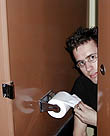|
|
This topic comprises 2 pages: 1 2
|
|
Author
|
Topic: What is 'plate glass'?
|
|
|
|
|
|
|
John Pytlak
Film God

Posts: 9987
From: Rochester, NY 14650-1922
Registered: Jan 2000
|
 posted 08-14-2004 07:21 AM
posted 08-14-2004 07:21 AM





Optical quality glass has fewer internal defects that might scatter light, reducing contrast. It is coated to tighter tolerances for thickness, so it is perfectly flat and won't distort the light going through it. It does not contain impurities that may give it coloration (cheaper glass is often slightly green in color). Glass used for projection ports should have anti-reflection coatings, that reduce the amount of light reflected at the surfaces -- less light reflected means less light "bouncing around" within the glass (less flare), and more light on the screen (less reflected back toward the projector).
You often see terms like "water white" (little coloration), the percentage of reflection (the lower the better) or the percentage transmission (the higher the better) in the specs.
Obviously, all these improvements add to the cost, but it is well worth it.
Contrast Killers
quote:
Contrast Killer 5: Poor Ports
The projection port is just as important as the lens in delivering high-quality
images. Plain window glass should not be used. Only optical quality glass with
anti-reflection coatings should be used. Port glass should never be installed
perpendicular to the projection beam, to avoid reflecting light back into the
projector lens. Likewise, if two panes of port glass are needed for sound
isolation, care should be taken to avoid internal re-reflection. Soundproof,
angled port glass frames are available from several vendors. Port glass should
be absolutely clean and scratch-free. As with the projection lenses, loose dust
should be gently brushed away with a camels-hair lens brush, and liquid lens
cleaner and lens tissue used for cleaning any haze. Ideally, the projected
image should be almost invisible on the port glass, with no detectable
scratches or haze.
http://www.cinemaequipmentsales.com/dolby9.html
quote:
Regardless of the wall structure, projector noise will escape through any single sheet of projection glass. port glasses should be angled to reduce lateral reflections; as a worst case example, internal reflections from a single port glass set at 900 to the line from lens to screen will result in numerous reflections leading to a soft screen image apparently out-of-focus. A good result will be a front glass set at perhaps 70 forward from the lens angle, and a rear (auditorium side) glass set at 150 backwards.
Care should be taken over the quality of glass used, and optimum projection requires coating to further avoid internal reflections. (3)
http://www.opticalcoatings.com/projection.htm
quote:
Our port window glass is called Water White. The transmission rate is between 98% and 99%. The glass transmits 99% < 3mm thick, 98% > 6mm thick of the visible spectrum. For more details on the specs see our Water White glass page. Standard port window glass thickenss is 6mm. We have 8mm and 10mm available as well, with 12mm available in the winter of 2001.
This glass is ideal for use in theater projection rooms, in what are called port windows. The dual A/R Coating increases the transmissivity to provide true color through the glass. This is the highest clarity port window glass, with no coloration. The port glass in the projection room is nearly invisible.
Regular glass absorbs the colors and brightness of projected light, thus dulling the screen image. Optical Coatings' specially coated glass transmits more light onto the projection screen. Movies are seen the way the Director and Cinematographer intended - with brighter, truer colors.
Our high transmission, two-sided antireflective coated clear glass is suitable for use in motion picture projection room construction. Our glass is especially suitable for multiple projectors, such as those in IMAX theaters, where every bit of light transmission is critical.
http://www.widescreenmuseum.com/widescreen/superpanatar-c.htm
quote:
By the same token that it is imperative to use only the finest objective lens in connection with the SUPER PANATAR, it is quite important that only the best grade of glass be used in the projection port. The glass should be water-white, optically flawless, coated, and should be treated with the same care as a lens. If these precautions are not taken, the port glass can introduce loss of definition, loss of light transmission, and a detrimental change of color in the projected image.
http://www.portwindowglass.com/
quote:
Water white, low iron, ultra clear glass transmits 98% to 99% of light, and is anti-glare and ant-reflective coated. This glass is preferred for all theater technology, and is necessary for digital equipment. Water White Glass allows lower intensity light to be passed through the port. Used as a theater glass, our water white glass outperforms other ultra clear products. We use a process that insures defect free glass.
American Computer Optic's OptiClear Water White Glass is the port window glass of choice for Christie Digital Labs and THX Labs. Thicknesses are available in 3mm, 6mm and 10mm. Water White Glass under 3mm thick transmits 99% of visible light, while over 3mm thick transmits 98% of visible light. Sheets are available up to 6ft X 8ft. Use our contact form to request a quote. Please include size and thickness specifications.
Water white glass is available as tempered product. Hydrophobic coating is also available to repel dust, dirt, water and oil build-up.
| IP: Logged
|
|
|
|
|
|
|
|
|
|
|
|
|
|
|
|
|
|
|
|
|
|
|
|
|
|
All times are Central (GMT -6:00)
|
This topic comprises 2 pages: 1 2
|
Powered by Infopop Corporation
UBB.classicTM
6.3.1.2
The Film-Tech Forums are designed for various members related to the cinema industry to express their opinions, viewpoints and testimonials on various products, services and events based upon speculation, personal knowledge and factual information through use, therefore all views represented here allow no liability upon the publishers of this web site and the owners of said views assume no liability for any ill will resulting from these postings. The posts made here are for educational as well as entertainment purposes and as such anyone viewing this portion of the website must accept these views as statements of the author of that opinion
and agrees to release the authors from any and all liability.
|

 Home
Home
 Products
Products
 Store
Store
 Forum
Forum
 Warehouse
Warehouse
 Contact Us
Contact Us




 Printer-friendly view of this topic
Printer-friendly view of this topic


















